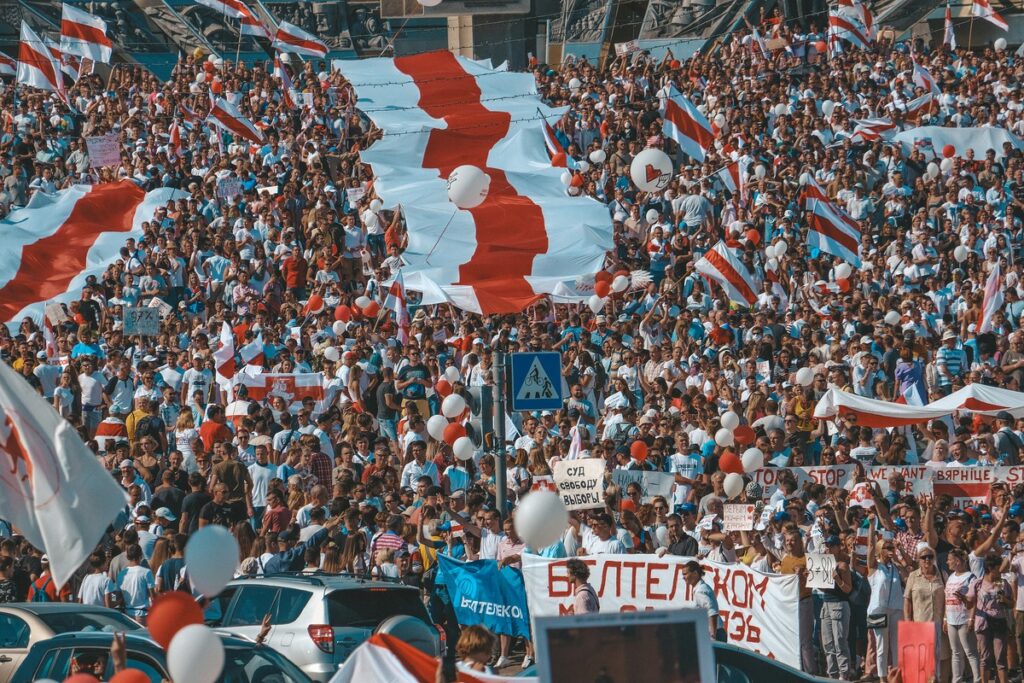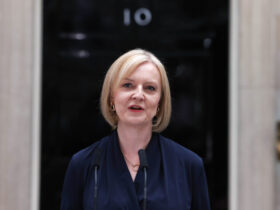For Belarus’ LGBTQ population, violence is not unfamiliar, and the recent protests calling for an end to President Alexander Lukashenko’s rule are only a step toward fundamental rights and protection for minority groups.
Since the disputed August 9 election, a massive public movement erupted and thousands of citizens across the Eastern European country cried out for the end of Lukashenko’s 26-year-long presidency. The world has watched as Belarus’ citizens, notably led by women, have protested in the streets and faced state-sanctioned violence from militarized special police, known as the OMON.
Country-wide demonstrations have been held in support of opposition candidate Svetlana Tikhanovskaya, who ran symbolically in the place of her husband, popular blogger and Youtuber Sergei Tikhanovskaya, who was prevented from registering as a candidate and arrested for causing public unrest. Svetlana was forced to flee the country after the election, but has become a rallying call this election as the person to end Lukeshenko’s presidency.
The LGBTQ community in Belarus is protesting, facing police brutality in the hopes of ending the current dictatorship and making progress against deep-rooted anti-queer sentiments. On the frontlines, community members are being beaten and detained everyday, a critical, and overlooked, component of the demonstrations.
A History of Homophobia
Belarus has notoriously persecuted its queer population. Same-sex relations have been legal since 1994, when a Nazi-era law used to criminalize and kill gay men was repealed. However, there has been a distinct lack of legal protections or rights, leaving hate crimes rampant, with courts rarely recognizing homophobia and a hostile government that only fuels the violence. In 2012, Lukeshenko notoriously responded to the claim by a German minister that he was “Europe’s last dictator” that it was “better to be a dictator than gay.”
In 2013, Belarus had its most recent LBGT-related legal battle, as gay activists pushed for the registration of a public LGBTQ association that was denied by Belarus’ Department of Justice and Supreme Court. Mikhail Pischevsky, the leading architect of the proposed association was attacked the next year in Minsk outside of a gay nightclub and called a pidor, Belarusian for “faggot,” by his assailant. Doctors remove 20% of his brain in attempt to save his life, but he died 17 months later. Belarus’ courts decided that the attack had no homophobic motive.
In August of 2019, gay filmmaker Nikolai Kuprich and his two friends were assailed in Minsk as the attacker used homophbic slurs. Courts ruled that there was no homophobic motive, until Minsk recognized the crime has hate-motivated in December.
The post-Soviet state is marred by legal, social, and institutional homophobia. In 2016, Lukeshenko signed a law into effect banning information that “encourages habits contradicting the development of a healthy lifestyle” or “that discredits the institution of the family and marriage.”
This modeled neighboring Russia’s infamous 2013 gay propaganda law, and provides for the targeting and infringement of human rights for queer people in Belarus. The Russian law threatens affirming education and support services and essentially bans resourceful and positive LGBTQ information for minors. Human Rights Watch called the law “a classic example of political homophobia.”
Meanwhile, the government has called same-sex relations “fake” and stated that “the overwhelming majority of Belarusians adhere to traditional family values,” in response to the British embassy flying the Pride flag in 2018.
“Pidor”
In Belarus there is no meaning to the word “queer” like in Western Europe or the United States. There is only pidor, a word that has been derogatorily charged against gay people as well as against Lukashenko in recent protests.
Belarus’ “pidor family” have joined the protests against Lukeshenko, and in doing so, risked their own personal lives and safety. Police abuse detainees, and activists say that for members of the LGBTQ community, this violence is routine. Officers call them “pidors” and say that “people like [them]need to be killed.” Activists who are arrested and released then have the threat of their personal information being published or leaked, which can destroy lives.
When recalling the scene at a riot, queer activist Andrei Zavalei told Politico: “When I think of this very moment, recalling the fear, shock and terror I faced, it doesn’t feel like an exceptional experience for me. I’ve had the same feeling of insecurity and oppression many times before.”
As first hand reports of police violence and abuse against protesters and detainees are being published, it is clear that the Belarus security forces employed tactics to terrorize citizens. One man told Radio Free Europe Radio Liberty his account of being raped with a truncheon by police while detained in August.
There is an undercurrent of violent homophobia entrenched in Belarus’ culture and history that these divides have manifested in the volatile situation between the government and protesters. Recently, a popular Belarusian rock band reversed the special forces “OMON” to read “HOMO.” In the streets, police attack demonstrators, shouting, “on your knees, pidor,” while protestors have painted “go away, pidor,” calling for Lukeshenko to resign. Mocking one’s sexual identity has become a tool of verbal violence for both sides.
While visibility is a strength, it comes at a price. Some protestors openly bearing the rainbow Pride flag face retaliation from within the anti-Lukashenko movement, who do not welcome them. Meanwhile, bearing Pride flags gives potential fuel for the government to denounce the protests as Western-backed, delegitimizing the movement.
“We needed to document the participation of LGBTQ people in the revolution,” said Anna Bredova, an activist and organizer in Belarus. “We wanted to show that we also support the revolution and we’re also taking part in the protests.”
Yet, even Svetlana appears not to be the saving grace for the community, stating on gay marriage: “I’m totally fine with same-sex relations and think any love is wonderful, but perhaps our country isn’t ready for a decision on this just yet.”
Visible or not, the pidor family has been on the front lines, facing tear gas, stun grenades, and rubber bullets from police. They did not start their fight in August, and the fight will not end after the result of this election. Still, the possibility of a new president brings hope for a better future.
“In a country with such depressing and frustrating conditions for LGBTQ people, we are determined to be patient and creative,” Zavalei said.







